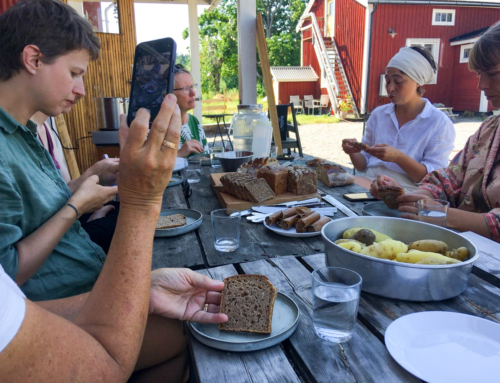I’m reading reading a moving and important book by Sharon Astyk called “Depletion and Abundance: Life On The New Home Front”.
Uniquely among recent books on life after the Peaks – energy, protein, biodiversity etc – Astyk does not write to scare us all witless. She does not write about elaborate ways to fix The Economy. She does not even furnish a shopping list of green tools and equipment that we can all buy as evidence that we are Doing Something. (This latter prohibition is a particular disappointment to Kristi and me: we’ve been compiling a shopping list of high-end fruit dryers, choucroute kits, and grain grinders, that we were about to send to our friends before Christmas).
On the contrary, Astyk writes about the benefits that can come (and will come, for most of us) from being poor in material terms. She proffers practical advice on how best to live comfortably with an uncertain energy supply; prepare children for a hotter, lower energy, less secure world; and generally how to survive and thrive in an economy in crisis.
This shocking approach clearly freaked out the the New York Times: they ran a patronising story in their Fashion and Style section about Astyk’s work and life. The Times even dug up a so-called “mental health professional” – a Dr. Jack Hirschowitz – who was happy to pronounce Astyk’s “compulsion to live green in the extreme” as a kind of disorder.
There is no recognized syndrome in mental health related to the “compulsion toward living a green life” but Hirschowitz – a professor at the Mount Sinai School of Medicine, for goodness sake – said that “certain carborexic behaviours might raise a red flag.
“The critical factor in determining whether something has reached the level of a disorder is if dysfunction is involved,” he said. “Is it getting in the way of your ability to do a good job at work?”.
Aaah: work. That would be the activity that makes tens of millions of people do depressed that they have to be medicated by people like Dr Hirschowitz just so they can carry on doing it?
And that would be the work whose trainees – ten per cent of all American school-age boys – are now doped up to the gills with psychoactive drugs by Dr H and his colleagues to make them pay attention?
Rather than fight The Economy, or try to fix it, Astyk seems to be suggesting that we simply ignore it – that we unplug. It’s a very un-male, un-macho solution – which is why the book is subversive.
Astyk may have unplugged, but she’s not the one who’s unhinged.




